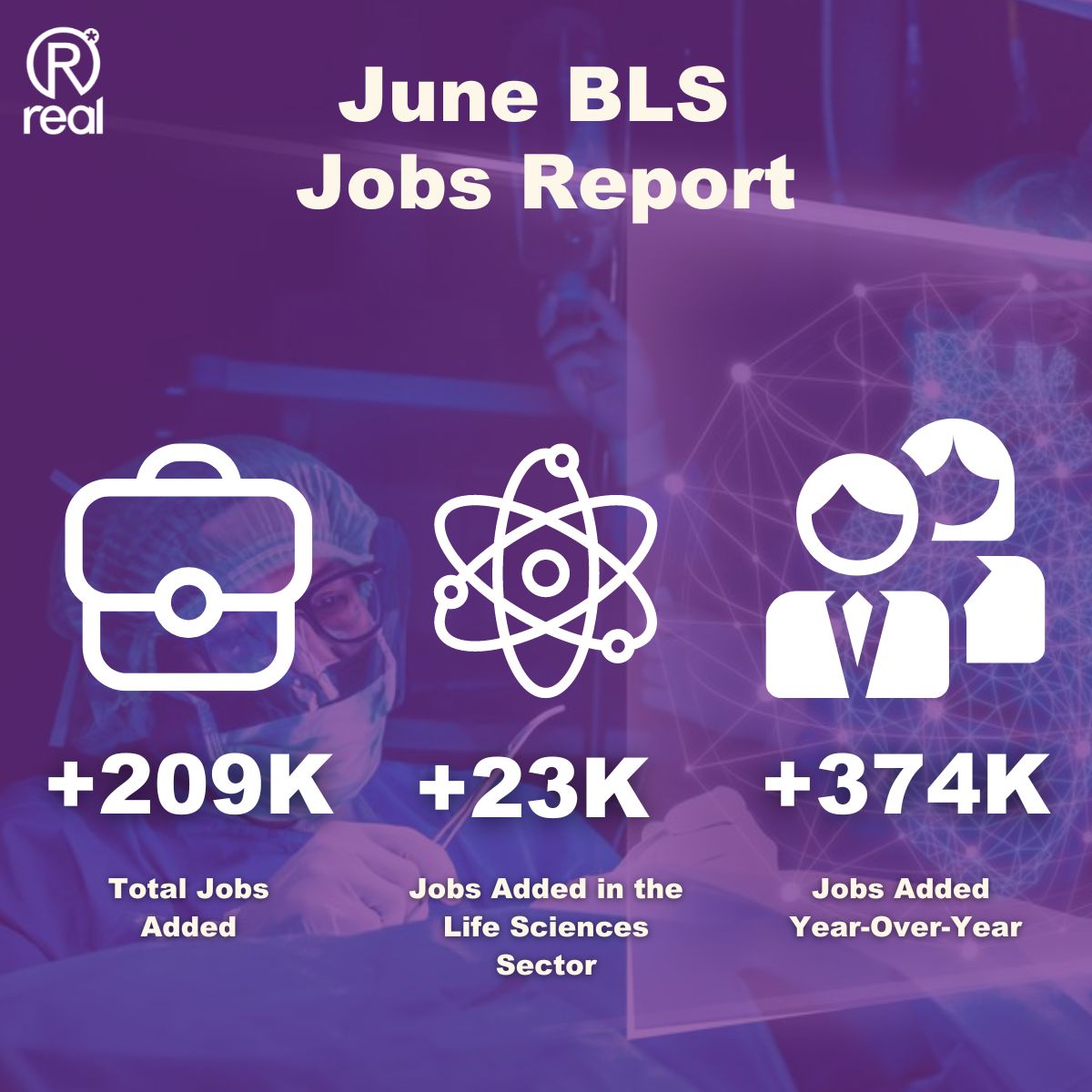June Jobs Report: 209K jobs added, life sciences contributes +23k
Another 209k jobs were added and unemployment went down to 3.6% in June's Bureau of Labor Statistics Jobs Report. This came as a major surprise following ADPs reporting of 490k jobs added earlier in the week but was much more in line with analyst predictions of 240k job additions. The professional, scientific and technical services subsector, which includes life sciences, was a top contributor with 23k jobs added.
This marks the smallest total increase overall in more than two and a half years, perhaps a sign the labor market is cooling off as rising interest rates gradually weaken the economy. The softer employment report could mollify senior officials at the Federal Reserve, who want a slow in hiring and economic growth to help them bring down high inflation. Yet it might not be enough to forestall a further increase in interest rates. The Fed is widely expected to raise rates later this month as it seeks to restore inflation to pre-pandemic levels of 2% or less. Inflation has been stuck in the 4% to 5% range.
In terms of hiring, while worker shortages have largely ebbed, many industries, specifically life sciences, are still experiencing a high number of jobs open versus workers to fill the positions challenge. Here's a look at key jobs report insights.
Key Life Sciences Jobs Report Insights
Total Jobs Added: +209k
Life Sciences Jobs Added: +23k in Professional, Technical and Scientific Sciences
Life Sciences Unemployment Rate: 2.6% which is down from May
YOY Gains: +374.6k jobs which averages +31k jobs per month
Demand For Skilled Life Sciences Workers
The demand for life sciences workers in parts of the U.S. is growing exponentially and outpaces the supply. For example, Massachusetts is surpassing the nation in job growth in this sector, according to a new report from the Massachusetts Biotechnology Education Foundation. Massachusetts is projected to grow life sciences jobs by 32%, or 42,000 new positions, by 2032. Overall employment in life, physical and social science occupations in the U.S. is projected to grow 7% from 2021 to 2031, resulting in nearly 100,000 new jobs over the decade, according to U.S. Bureau of Labor Statistics.
Read more: 2023 Life Sciences Market Report
The report is recommending investments in expanding specialized life sciences education and training programs because Massachusetts’ colleges and universities are only producing about half of the life sciences graduates needed to fill annual job openings over the next decade. It also recommends investing in workforce development programs to address areas of high demand and engage non-traditional workers.
On top of the clamor for people to fill technical and production positions, there is strong demand for talent in various corporate functions as life sciences companies continue to raise capital and grow. According to the latest data from CSBI, the managerial segment of the life sciences workforce surged by 33% from 2017 to 2020, with robust hiring in business functions such as finance, marketing, and human resources.
The Evolving Life Sciences Sector
Biopharma and MedTech companies have booked record-breaking revenues and become key players in business and geopolitics. They now have immense forward momentum: many are upgrading their earnings forecasts thanks to higher-than-expected revenues from vaccines and other COVID-19 treatments and testing. To sustain this momentum, they need to recruit talent that will enable them to meet challenges, from digitalization to the aging population.
Read more: Attracting Top Life Sciences Talent
The digital transformation has already forced these companies to ramp up hiring to fill gaps in their workforces, particularly as science, computing, and A.I. converge. Computing and IT roles in Massachusetts’ life sciences industry have increased 52% since 2019, according to MassBioEd. There are plenty of support roles needing to be filled in this rapidly growing sector.
Work With Us
In a fiercely competitive job market for life sciences professionals who have their pick of roles, it can pay dividends to work with a specialist employment agency instead of a more generalist headhunting firm. Because Real Staffing focuses purely on STEM recruitment, we better understand the needs of life sciences employers and have relationships with a diverse and widely skilled pool of highly qualified candidates who we have already vetted, so our clients do not waste time screening unsuitable candidates. Whether you’re an employer or professional seeking your next career move, " target="_blank">contact us today to get started.

